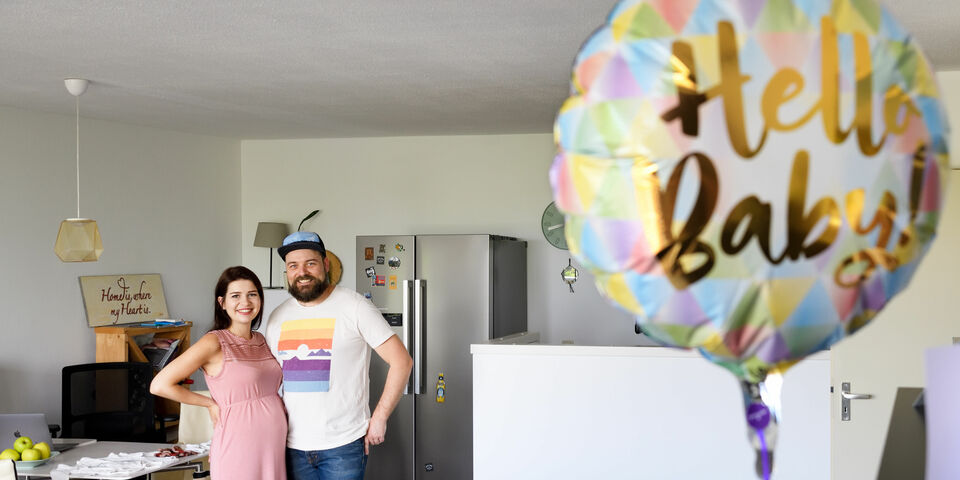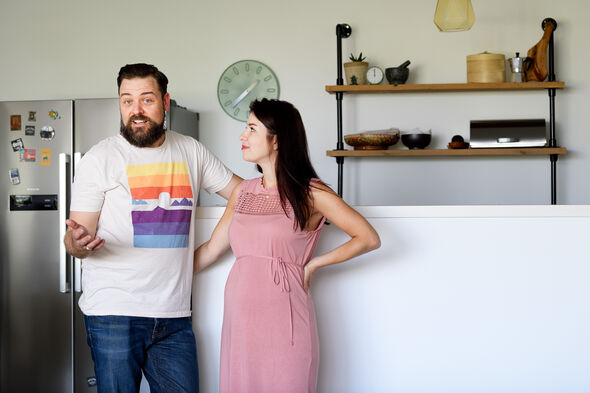“A unique year, because of corona and twins”
Working from home during the corona crisis is slowly becoming our ‘new normal’. We learn to deal with the changed framework and our pitfalls in this situation, find our way in being at home and miss the campus and each other in the meantime like never before. Cursor frequently calls a fellow remote worker to find out what’s up. Today: assistant professor Roy van der Meel, for whom working from home means that he is able to support his wife, who is pregnant with twins.
When Roy van der Meel, assistant professor of Precision Medicine at TU/e’s Biomedical Engineering department, arrived home from work on the day of the lockdown, his wife surprised him with a positive pregnancy test.
Due to corona, Roy had to sit in the waiting room when he and his wife Anna went to the obstetrician for their first ultrasound. “At a certain moment the obstetrician waived to me: “Mister Van der Meel, you should see this!” It turned out that Anna was pregnant with twins, expected to be born around October.
That immediately explained why Anna suffered from unusually severe nausea during her pregnancy. “And then it became clear that there was a positive side as well to being forced to work from home,” Roy says smiling, as he puts everything into perspective, “because now I was able to support Anna when she withdrew to the smallest room of the house for activities I won’t share with the readers.” By now, the expectant mother is doing slightly better. “2020 will go down as a unique year for us, that’s for sure,” Roy says with pride from behind his laptop.
Teaching from home
Roy doesn’t plan his days much differently now that he’s working from home. “I’m certainly not less busy; I submit research proposals, write papers, supervise students. All of that continues, only online.”
He currently spends much of his time teaching. The basis for this is the research conducted in the Precision Medicine group, where he started in January 2019. “Our expertise lies in the development of immune therapies based on nanomedicines. Group leader Willem Mulder and I set up a new course together that covers the entire cycle of nanomedicine development. The first part is about the basis, the building blocks and self-assembly process, analysis techniques, preclinical development, but also about diagnostic and therapeutic applications. We also focus on upscaling and producing nanomedicines and the eventual translation into actual drugs. Entrepreneurship is something we address as well.”
Online advantages
For practical reasons, the course was supposed to be taught to a maximum of 25 students. When corona arrived on the scene, everything suddenly needed to take place online. “Many students who were supposed to travel abroad for an internship or for their graduation asked whether they could take this course, because they had to stay here anyway. Eventually we ended up with sixty students. That means there’s more work for us to do because we have to evaluate more, but we want to support students as best we can,” Roy says enthusiastically.
And even though recording a lecture in front of an empty lecture hall feels very strange, Roy also sees the advantages of online teaching. “It’s much easier for students to give feedback via Teams, so it becomes very easy to make changes during the course. That is why teaching this course is a steep but excellent learning curve.”
Back to the lab
His group’s research was suspended for some time due to the corona crisis, but has by now started again. Since the labs carefully reopened in early May for PhD candidates and postdocs, Roy can be found in Helix every Thursday as responsible staff member. “I’m available for questions or unforeseen calamities. In the meantime, I can work on my own research, write papers, or teach courses online.”
The members of the Precision Medicine group meet regularly to discuss progress. “It wasn’t always that easy for them over the recent period, especially when you can’t go to the lab. We try to stimulate them to maintain the rhythm as much as possible and to keep working on their research, so that they are instantly ready to go once the university reopens. They’ve handled this extremely well. For example, they started the iVAC initiative, which is supported by the ICMS, together with colleagues from the groups led by Tom de Greef and Maarten Merkx.”
Roy doesn’t expect that everyone who works in the lab will soon be allowed to come to campus again. “I don’t think we’ll all be together in the same room for a meeting any time this year.”
Selfie stick
In any case, 2020 will go down as a special year for him. “On the one hand it’s an awful year. It makes you realize what really matters, which is health and family.” But Roy has enough to look forward to: “Fathers-to-be are allowed to be present during the ultrasound again, so now my wife won’t have to film it with a selfie stick anymore. For us, this year will always be unique.”




Discussion